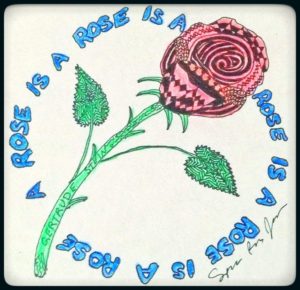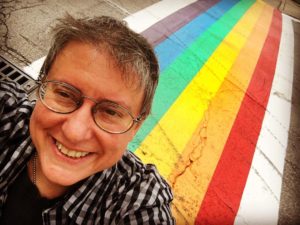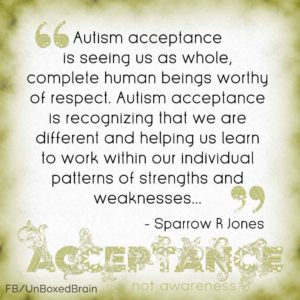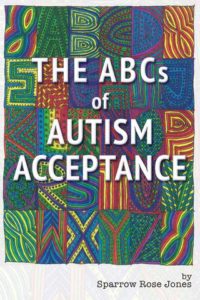
[image description: a sketch by Sparrow Rose. A rose, colored red, with different geometric patterns on each petal and the name Gertrude Stein inscribed on the green stem. The rose is superimposed over a circle of blue letters with the Stein quote, “A rose is a rose is a rose” encircling infinitely, like the plates Stein’s lover, Alice B. Toklas, used to sell.]
I stumbled across
an article on Lifehack about Avoidant Personality Disorder this morning. I read through the article, alternating between, “yes, this is exactly me,” and “a mental disorder is only a disorder if it’s not true. You’re not paranoid if they really are out to get you.”
Finally I got to the section that said:
“What is known, however, is that symptoms first start manifesting from infancy or early childhood. The child will display shyness, isolation, or discomfort with new places or people. Often times, children who do exhibit these tendencies grow out of it, but those with the disorder will become even more shy and isolated with age.”
That clinched it for me. I do not have Avoidant Personality Disorder if it is something that develops in childhood. It is not to say that someone else would not have both autism and Avoidant Personality Disorder at the same time. I am not a medical or psychological professional, so I can only talk about my own experiences and perceptions here in the hope that it will help others feel less alone or maybe give someone new things to think about and new avenues to explore.
I effectively have a mimickry of Avoidant Personality Disorder, caused by 50 years of being bullied by others. I have carefully studied the bullying and done whatever I could to make it stop. I have changed the way I dress, the way I wear my hair, my grooming habits. I have tried Dale Carnegie’s methods outlined in his book How to Win Friends and Influence People, I have tried sticking with social groups that center around my interests, I have tried surrounding myself with only fellow Autistics, I have tried blending into the background, and I have tried saying nothing at all ever.
The bullying will never stop. After half a century of it, I have come to realize this. It doesn’t stop when you grow up, or when you go to college, or when you find a job, or when you find work that you are good at, or even when you find a community of people who are similarly brained and have all grown up with the same crushing bullying themselves. It never stops and the only place where there is no bullying is alone.
I’m not saying this to get your pity. As graffiti in an ADAPT video says, “piss on pity.” I am saying it because it is a solid fact that needs to be acknowledged. No amount of zero tolerance policies can police the bullying away. No amount of social skills training can teach the victim how to stop being whatever part of who they are that attracts the bullies. The only way to stop the bullying is to stop letting bullies have access.
Temple Grandin does it with money — she has enough money to pay people to form a human shield around her so that she can live in a bubble where bullies are not permitted entrance. I don’t have that kind of money and am not likely to ever have even a fraction of that kind of money . The only way I can build a bully-free bubble in my life is to emulate Avoidant Personality Disorder. It wasn’t a conscious choice on my part … inch by inch, the bullies drove me back into myself. Like a slinking night creature, I have crept further and further from the glowing campfires of humanity and into the safe and soothing darkness of solitude.
Those who counseled me to “just put yourself out there” are complicit with the bullies. Those advisors have encouraged me to boldly stride behind enemy lines, unarmed. Sometimes they even blamed me for the shelling I received as a result.
When I tell people about the bullying, I get a few different reactions. One popular answer is to tell me I’m bringing it all on myself. If I just weren’t so … If I didn’t insist on always … If I’d just stop … And why can’t I blend in better?
Another answer I get is that I’m blowing it all out of proportion. Everybody gets teased. It’s part of how people make friends with each other and I just need to lighten up a little and learn to laugh at myself.
Some well-meaning people tell me that they can’t see how anyone would want to bully me because I’m such a kind and gentle, loving person. The thing is, whether I’m kind or whether I’m a jerk, the bullying is real and denying it could be possible is calling me a liar when I tell you that it does happen.
Let me talk a little bit about the traits of Avoidant Personality Disorder from the article — the traits that caused me to briefly question whether I might have Avoidant Personality Disorder or not. (I don’t. Through most of my childhood, I virtually flung myself at others. I am an extrovert and I spent my 20s seeking out human company all the time, alternating between hope and despair. It has only been in middle age that I have begun giving up and avoiding people. The accumulated years of bullying have finally weighted me down sufficiently to provoke an avoidant, hiding response to life.)
Reluctance to be involved with people unless certain they will be liked.
This has been me for a long time. Lately I’ve been feeling pessimistic enough about people liking me that I’m reluctant to be involved with anyone. This is not just the depression talking (although that’s a contributing factor, for sure.) I have gotten enough screen shots handed to me of people who smile to my face and then talk hate about me behind my back that I’ve learned not to trust anyone.
But even before I reached this critical mass, I have had a tendency for years to assume the worst. If someone is not clearly welcoming toward me, I assume they are just tolerating me and I try to go away before they reach the end of their tolerance. This is learned behavior on my part. After experiencing the same thing again and again, my pattern recognition finally kicked in. It is other people’s behavior that has taught me that someone who does not make it clear that they enjoy my presence might eventually “snap” and start abusing me because I didn’t get all their hints. Hints that I can’t see.
I can see people welcoming me and I can see people abusing me, but I can’t see all those little nudges and hints and insinuations and sarcasms, and social corrections. So when people aren’t clearly welcoming, it’s an act of self-preservation to go away before the abuse starts.
Takeaway lesson: if you appreciate an Autistic person, make sure to let them know. Take the emotional risk. Tell them that they’re wanted and liked or loved. You might embarrass them, sure. But you will also be engaging in clear communication that lets them know they are wanted and should stick around.
Avoidance of activities (whether professional or personal) that would require significant contact with others due to fear of rejection or criticism.
I just quit a job last week. I won’t pretend it was the greatest job ever. It was a job that claimed to pay $8.10 an hour and, technically, did. But it had such a draconian break policy that the realistic pay for the time I was required to be at their place of business in order to get my work done was more like $4.05 to $5.40 per hour.
But even with that, I needed that job. Four bucks an hour ain’t much, but money is money and I’m a little bit addicted to eating. So is my cat.
But the bullying was so crushing, I had to leave before the bullies stripped me of the shreds of self-preservation I had left.
The ringleader set me up so perfectly. He started out being very interested in what I had to say. He encouraged me to talk more. He found opportunities to get me alone to encourage me to open up even further, one-on-one. He showed interest in my writing and even started reading my book. He had gotten five chapters into it by the time I left.
I came to be deeply emotionally invested in him and his circle of friends. And then one day, when the hooks were good and set in me, he turned on me. He shouted at me. He called me names. And his friends began to perform live theater in front of me — imitating me, my movements, my way of talking, my favorite subjects. But all of it embarrassingly exaggerated, grotesque, and insulting.
I couldn’t even walk through the hall at work without getting waylaid and berated. I started hiding in my car, missing hours. I was falling behind in my hours and the boss said I had to make them up. I would have had to live at work all day long to make up those hours but the C-PTSD from all the years of bullying in school had kicked in at full force and my bullies started making a point of surrounding me. We could sit wherever we wanted in the workroom and I would quickly become surrounded by my bullies who would stare at me while they talked to each other and laughed.
I know it doesn’t sound like much. But try it some time. Life gets pretty grim when the only people you are ever in contact with are so clearly targeting you. I was becoming suicidal. I couldn’t possibly make up those lost hours. In a last ditch effort to save my life, I quit.
Significant contact with others is not viable for me. I have to meter my contact with people. It doesn’t take long before they realize I’m only there to be their punching bag. Places I can’t retreat, places I can’t hide — these are dangerous places full of bullies I can’t escape.
Takeaway lesson: If you know an Autistic who doesn’t want to go someplace, take them seriously. Investigate. Empathize. Don’t just decide they’re being lazy or willful. There’s a good chance they’re being damaged by that place and what happens there. Don’t jump to automatically contribute to the damage by forcing them to be there. Find out what’s wrong.
Unwillingness to try new things due to shyness or feelings of inadequacy, particularly in social situations.
My feelings of inadequacy in social situations are very real. I am not suffering Avoidant Personality Disorder – I am suffering humanity. People are cruelly unforgiving of those who cannot figure out the social rules and conform to them. People are exploitative of those who struggle to conform to the social rules and thus are easy dupes for con artists.
Yes, I am unwilling to try new things, so long as there are people involved with those things.
I saw a pair of roller skates I really like and would get if I had income, but I don’t want to skate with other people. I would love to spend more time hiking on trails but only if I can go alone. I love camping but I don’t want to camp with others. I’m interested in trying new kinds of writing, new art techniques. I’d like to play new musical instruments. I love learning languages but am limited in how far I can go because I don’t actually want to have a conversation in any language.
I am always open to the new experience …. but only if I can do it alone, without observers, without companions, without bullies.
Takeaway lesson: if you know someone Autistic who doesn’t want to try something new, don’t assume it’s “just the autism.” There could be other reasons. You might be the reason. If you didn’t react well the last times they tried new things, they might not want to try more new things …. when you are around.
Sensitivity to criticism, rejection, or disapproval.
Tell me what “sensitivity” means? Am I sensitive when I have been wounded again and again until I spend all my energy trying to spot the landmines and skirt around them? Is a soldier sensitive to Claymore mines? Is it right to call me sensitive after five decades of walking a never-ending social minefield?
Difficulty with building intimate relationships because of fears and insecurities.
I don’t trust anyone. How could I possibly build a close friendship or relationship when those connections are based on mutual trust and I have long since run out of trust?
I watched 13 Reasons Why and I could understand why Hannah became so guarded. After enough abuse had been heaped on her, she could never have dated Clay because she had lost the ability to trust that anyone could possibly like her and want to be with her just because she was a great person. Everyone abused and exploited her and then sneered at her as a “drama queen” when it was their treatment that had caused her to become so distressed in the first place.
This is what we do to victims of bullies. We look at the depressed, broken shells they have become and we blame them for it, telling them that their brokenness is why they are bullied.
It’s like telling someone that they just need to stop bleeding and the sharks will ignore them. But it was the sharks that bit them in the first place and they will never stop their feeding frenzy until they have devoured all the blood. Bullies devour their victims and they aren’t even courteous enough to swallow them whole. They tear pieces off them. And more pieces. And then they get excited when they see the emotional blood leaking from the wounds and bite larger and larger chunks, hypnotized by their own power to destroy another human being.
Is anyone surprised at difficulty with building intimate relationships after one’s being has been shredded by the shark teeth of constant bullying? What about the fears and insecurities that are real? How much does cognitive behavioral therapy repair a person who is afraid of and insecure about something that has been happening every time they are around people ever? How much therapy does it take to erase fifty years of bullying?
Feelings of being socially inept, inferior, or unappealing to others. As a result, there are tendencies to have extremely low self-esteem.
I wonder about this. Self-esteem, that is.
All my life, I have been told that I have low self-esteem. I can see why people would say that. I don’t “put myself out there.” I look at the ground when I walk (Partly because I don’t want to accidentally make eye contact with anyone but just as much because I need to see the ground. I have bad balance and low proprioception. If I can’t see the ground when I walk, I fall and hurt myself.)
Does it sound like low self-esteem when I say I am pathetic at making and keeping friends? Is it still low self-esteem when it’s the truth?
Does it sound like low self-esteem when I say that there just aren’t enough accommodations to make it possible for me to keep a job (I was kind of doing okay at the last really crappy and underpaid job until everyone decided to team up to make my life hell for their amusement) and that I struggle with poverty as a result? Is it low self-esteem when the truth is that my multiple disabilities get in the way and I really can’t support myself financially?
I don’t actually think I have low self-esteem. I am not happy with my body (who is?) but I know there is hope that I will be able to afford medical transition some day and I can finally feel at peace in my skin. But I also know I am more than just my body and I love the way I solve problems and puzzles. I love my musical talents. I’m still learning to draw, but I’m very proud of how quickly I’ve learned and how fast I ‘m progressing. I am proud of my writing skill and pleased to see that skill improving all the time. I am a compassionate, empathetic, kind-hearted person. When I am not depressed by poverty and bullying, I know that I matter. I help people all the time. My heart is filled with love. I feel at home in nature. I am a good person.
If I really am socially inept and unappealing to others (except as an amusing punching bag), is it fair to call my reaction of despair “low self-esteem”? It sounds like the problem is being centered in me rather than in the people who go out of their way to make my life as miserable as they can get away with.
Takeaway lesson: telling someone about their “low self-esteem” that only cropped up as a result of being mistreated by others is just another way to blame the victim for suffering someone else caused.
Yes, I am avoidant.
No, it is not a personality disorder.
It is a matter of survival.
The recent bullying is so fresh that it took me four hours of sitting in my car in the McDonald’s parking lot yesterday to finally overcome my physical exhaustion and go inside to get some electricity for my battery and get a little work done.
Avoiding is the tip of the iceberg. Being avoidant is debilitating and not always for the reasons you might assume. I am so tired all the time. I am worn out from carrying the burden of bullying all the time. I am exhausted. There is so much I want to do — I have long lists of things I’m excited to write, draw, record. But I’m running out of steam. Survival is too hard. It’s ground me down. I’m wearing out.
The price of permitting bullying to continue is unreasonable — at least for me. Maybe it’s because the rest of the world doesn’t have to pay my price — and because they have no idea what I would put into the world if I just had a little more energy — that they don’t care much about stopping bullies.
You can do your part, though. Stand up against bullying. If you can do it without making too much of a target of yourself, speak up when you see bullying. You might have to watch for it, though. Bullying is all around you and you don’t see it.
In high school I was so bullied that classmates put sexual statements about me in the school newspaper. “That couldn’t be true,” my mother said. “It was a good school. They wouldn’t have let that happen.”
But they did it in code. That’s how they got away with it. People are being bullied all around you and you don’t even see it!
They started by telling me they knew I was selling sex. (Good grief! I was 13 years old!) and that they heard I did it under a bridge on Dixie Highway. (What bridge? There is no bridge on Dixie Highway. They picked that road because it was on the south side of town where I lived and they had already spent months tormenting me about living on the poor side of town and wearing crappy clothes. Making this alleged sex selling take place under a bridge on Dixie Highway was just a way to fold their poverty shaming in with their sex shaming.)
So when the school newspaper had a gossip column and the gossip column said, “and which seventh grader was spotted under the Dixie Highway bridge last Friday night?” it was crystal clear to me and my bullies what had just happened — I couldn’t even read the damned school newspaper without being jabbed by my bullies. But it was completely invisible to faculty and parents.
Bullying goes on right under your nose all the time. It’s impossible to stop it.
But I hope you’ll try anyway.
It’s too late for me. But there are children being shredded by the shark teeth right now. Don’t let them grow up to be people who can’t even go to work because the shark bites never healed and run so deep that they bleed all the time, continuing to attract more sharks all the time.
Don’t feed the sharks. Take their food away from them. And don’t blame the victims of shark attacks by telling them they smell like sharkbait.
The Lifehack article says:
“The cause of Avoidant Personality Disorder is still undiscovered, but scientists believe that it may stem from genetics or as a result of childhood environments, such as experiencing emotional neglect from parents or peers.”
So maybe I do have Avoidant Personality Disorder after all. Maybe I’m just incredibly resilient and it took decades of bullying and emotional neglect to create Avoidant Personality Disorder in me whereas most people develop it after only a few years of the same.
It should be a crime. And the whole damned world is guilty.
So why is it me that has to live in the prison they created with their mockery and hatred? Why am I the one being punished for everyone else’s lack of …. well, I was going to say lack of humanity, but since they all behave this way I guess bullying is definitionally an act of humanity. It seems to be me who is not part of the fold.
I don’t have any answers to that.
But from my prison I will continue to send out love letters and lifelines of hope and poetic writing for others to catch hold of like a rope tossed from an extreme place. Sure, the bullies will catch hold of that rope and jerk on it. They always do. They won’t ever stop. But my words will sail over their heads at the same time, floating out to the world where they will offer those with the shark tooth shaped scars on their spirit the healing balm of knowing someone else sees, someone else knows, someone else understands. I know what the sharks can do and I offer you the only thing I have: my words.
And this is what I say to you who are circled by sharks: escape. Find a break in the wall of sharks and swim through as quickly as you can. Don’t look back. Stay one stroke ahead of the sharks and there is good life to be found in the water. Don’t sink. Don’t drown. Keep swimming.
Do not let the sharks decide what you are worth and what you get to do.
Okay, I know that, to some degree, they do and will. The sharks own this world.
But there are stretches of clear blue water on smooth seas filled with playful dolphins and swaying anemones. Find them. Strike out and find your safe waters and own them.
And I’ll keep swimming too.












Recent Comments